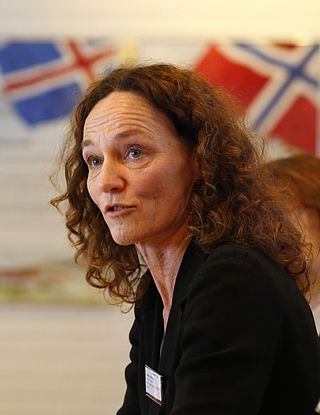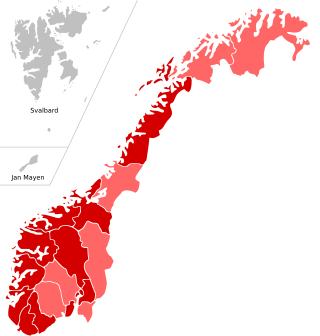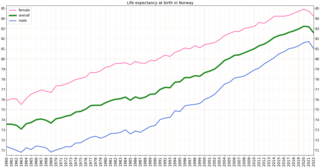
The Uganda Virus Research Institute (UVRI) is a medical research institute owned by the Uganda government that carries out research on communicable diseases in man and animals, with emphasis on viral transmitted infections. UVRI is a component of Uganda National Health Research Organization (UNHRO), an umbrella organization for health research within Uganda.
Public health surveillance is, according to the World Health Organization (WHO), "the continuous, systematic collection, analysis and interpretation of health-related data needed for the planning, implementation, and evaluation of public health practice." Public health surveillance may be used to track emerging health-related issues at an early stage and find active solutions in a timely manner. Surveillance systems are generally called upon to provide information regarding when and where health problems are occurring and who is affected.

The European Centre for Disease Prevention and Control (ECDC) is an agency of the European Union (EU) whose mission is to strengthen Europe's defences against infectious diseases. It covers a wide spectrum of activities, such as: surveillance, epidemic intelligence, response, scientific advice, microbiology, preparedness, public health training, international relations, health communication, and the scientific journal Eurosurveillance. The centre was established in 2004 and is headquartered in Solna, Sweden.

The Indian Council of Medical Research (ICMR), the apex body in India for the formulation, coordination and promotion of biomedical research, is one of the oldest and largest medical research bodies in the world.
The Burnet Institute is an Australian medical institute that combines medical research in the laboratory and the field, with public health action to address major health issues affecting disadvantaged communities in Australia, and internationally.

The Ministry of Health and Family Welfare, also known by its abbreviation MoHFW, is an Indian government ministry charged with health policy in India. It is also responsible for all government programs relating to family planning in India.
The Government agencies of Norway are state-controlled organizations that act independently to carry out the policies of the Government of Norway. The government ministries are relatively small and merely policy-making organizations, allowed to control agencies by policy decisions but not by direct orders. A minister is explicitly prohibited from interfering with the day-to-day operation in an agency or the outcome in individual cases. While no minister is allowed to give orders to agencies personally, they are subject to decisions made by the government. Also, the minister is normally the instance of appeals for agency decisions.
The Norwegian Centre for Violence and Traumatic Stress Studies is a research centre in Oslo, Norway, and Norway's national research institution in violence and sexual abuse; disaster management, terrorism, armed conflicts and traumatic stress; and forced migration and refugee health research. It is interdisciplinary and employs experts mainly in psychology, psychiatry, and the social sciences. In addition to carrying out research and related activities, the institute advises the Government of Norway in its areas of expertise and has some official emergency management functions at the national level. NKVTS has 101 employees.

Camilla Stoltenberg is a Norwegian physician and researcher. Since 13 August 2012, she has been Director-General of the Norwegian Institute of Public Health. She is the sister of former Prime Minister of Norway and General Secretary of NATO, Jens Stoltenberg.

The 2009–2010 flu pandemic in Norway marked the initial phase of a new influenza pandemic. This pandemic began in the spring of 2009, the illness appeared in tourists returning from affected areas. By the summer of 2009, local person-to-person transmission within Norway was established. Soon thereafter, the number of patients being tested for swine flu exceeded capacity, and authorities recommended that only patients with severe symptoms be tested. The first Norwegian death from swine flu was reported in early September 2009.
National public health institutes (NPHIs) are science-based governmental organizations that serve as a focal point for a country's public health efforts, as well as a critical component of global disease prevention and response systems. Among the better known NPHIs are the United States Centers for Disease Control and Prevention, and the Chinese Center for Disease Control and Prevention.
The International Association of National Public Health Institutes (IANPHI) is an international umbrella organization of national public health institutes (NPHIs), public health government agencies working to improve national disease prevention and response. IANPHI is made up of 100+ members, located in more than 90 countries. An important goal of IANPHI is to improve health outcomes by strengthening NPHIs or supporting countries in creating new NPHIs.

The National Health Laboratory Service (NHLS) is a South African national government institution established in 2001. It was created by merging the South African Institute for Medical Research (SAIMR), the National Centre for Occupational Health and the National Institute for Virology. It also absorbed various provincial health department and university-run pathology laboratories.

Health in Norway, with its early history of poverty and infectious diseases along with famines and epidemics, was poor for most of the population at least into the 1800s. The country eventually changed from a peasant society to an industrial one and established a public health system in 1860. Due to the high life expectancy at birth, the low under five mortality rate and the fertility rate in Norway, it is fair to say that the overall health status in the country is generally good.
Lars Weisæth is a Norwegian military psychiatrist. He is Research Professor Emeritus at the Norwegian Centre for Violence and Traumatic Stress Studies, Professor Emeritus of Disaster Psychiatry at the Institute of Clinical Medicine at the University of Oslo and a lieutenant-colonel and former chief psychiatrist of the Norwegian Armed Forces Medical Service.
The National Institute for Communicable Diseases (NICD) is the national public health institute of South Africa, providing reference to microbiology, virology, epidemiology, surveillance and public health research to support the government's response to communicable disease threats.
The COVID-19 pandemicin Norway resulted in 1,512,647 confirmed cases of COVID-19 and 5,732 deaths.
Public Health Institute of Malawi (PHIM) is a Malawian government agency and research institute, as well as Malawi's national public health institute. It is subordinate to the Ministry of Health. PHIM builds the capacity of the country to effectively attend and deal with public health challenges including emerging communicable and non-communicable diseases.
Guri Rørtveit is a Norwegian physician, researcher and civil servant. Since 2024 she has been director general of the Norwegian Institute of Public Health.








